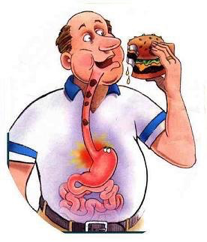Gastric Reflux (GERD) refers to the regurgitation of acid stomach contents into the esophagus. The most common clinical manifestation of GERD being heartburn and acid regurgitation.
Reflux occurs when the pressure inside the stomach is higher than that maintained by the muscles found where the stomach and oesophagus meet.
Causes of Acid Reflux
GERD may develop due to decreased muscle tone or abnormal relaxation of lower oesophageal sphincter or reduced stomach motility, allowing food to remain too long in the stomach.
Episodes of reflux are triggered or worsened by a variety of factors. Symptoms may be aggravated by chocolate, caffeine, alcohol and spicy foods, which stimulate acid secretion or by fatty foods, which delay stomach emptying,or even when the patient bends over or lies horizontally after having meal. In addition, pregnancy or constipation may worsen GERD by increasing intra-abdominal pressure.
Secondary causes of GERD includes reflux caused by acid hypersecretory states, connective tissue disorder(scleroderma), gastric outlet obstruction as caused by ulceration and stricture, and delayed gastric emptying due to conditions such as stasis, neuromuscular disease, pyloric dysfunction, duodenal dysmotility, or duodeno-gastro-esophageal bile reflux.
Symptoms
Symptoms of GERD includes in addition to heartburn, difficult or painful swallowing, a sour taste in the mouth, and frequent belching. Less typical features include chronic cough, hoarseness, sore throat and a sensation of fullness. Acid reflux due to GERD can also erode teeth.
Obesity is thought to be another potential predisposing factor to gastro-esophageal reflux. Maintenance of ideal weight for age may help in reducing the symptoms.
Dietary Modification
The foods you eat affect the amount of acid your stomach produces. They can also be directly irritating to the esophagus. Diet and nutrition are key considerations for those who suffer from acid reflux or gastro esophageal reflux disease (GERD), a severe, chronic form of acid reflux. You can prevent or relieve your symptoms from gastro esophageal reflux (GER) or gastro esophageal reflux disease (GERD) by changing your diet. You may need to avoid certain foods and drinks that make your symptoms worse. Other dietary changes that can help reduce your symptoms include
- decreasing fatty foods
- eating small, frequent meals instead of three large meals




